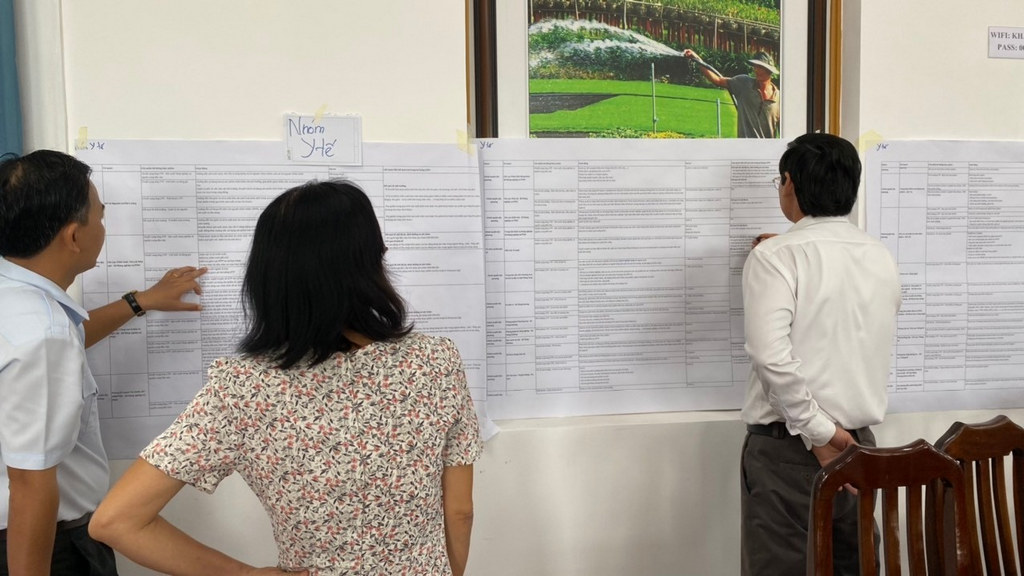

The meeting was attended by over 35 local officials and experts from the Department of Agriculture and Rural Development, the Dong Thap Technical Task Force, related departments in Dong Thap, and representatives from the interdisciplinary mission, including IPSARD, the Bioversity Alliance and CIAT, the Vietnam Academy of Agricultural Sciences (VAAS), the Center for Agricultural Systems Research and Development (CASRAD), the Institute of Agricultural Environment, and the National Institute of Nutrition.
During the morning session, the research team presented results and gathered feedback to complete the evaluation of the current status of the Dong Thap food system. The content presented and discussed included: i) The set of prioritized indicators selected for each component to evaluate the current food system in Dong Thap (including the relevance of the indicators, their contribution to outcomes in health and nutrition, economics, and the environment); ii) The list and roles of organizations, agencies, and units involved in each component of the current food system in Dong Thap; and iii) Ongoing programs/projects related to the food system transformation process in Dong Thap.







Image: Group discussion during the meeting.
Experts, local officials, and researchers from the interdisciplinary mission were arranged into groups by field of expertise to discuss and share feedback. Based on the presentations and discussions, feedback was gathered by the research team and the mission for further refinement.
During the working trip to Dong Thap, the interdisciplinary mission, with the introduction of the Department of Agriculture and Rural Development of Dong Thap, visited a stall displaying safe food products meeting organic standards (PGS). This stall, located at the Agricultural Service Center for Irrigation and Rural Clean Water Management, offers over 40 types of agricultural products to consumers. This model fosters a strong connection between certified producers and businesses providing organic products, helping to increase farmers’ income and positively contributing to consumers' health and nutrition by offering clearly sourced organic products. This model is gradually changing the awareness and mindset of producers and consumers in Dong Thap regarding high-standard products. Dong Thap aims to strengthen traceability practices starting from production stages, holding farmers accountable for the quality of their products.

Image: Working at the Agricultural Service Center for Irrigation and Rural Clean Water Management to explore the model.


Image: Direct visit to the Product Display Stall.
Dong Thap province calls on international partners, such as the Bioversity Alliance and CIAT, and related stakeholders to continue supporting the model, with a desire to expand it throughout the province. Specifically, Dong Thap intends to establish self-managed organic agricultural production areas in each district following the PGS model and connect these with distribution channels to bring products to the market. Therefore, Dong Thap seeks support from stakeholders and donors to build, develop, and expand transparent, responsible, and sustainable supply chain models linked to the Food System Transformation and to fulfill the tasks in the ecological agriculture development plan, modern rural development, and civil farming.
The development of ecological agriculture will begin with production transformation through specific models – changing producer awareness and mindset, shifting consumer behavior, and raising awareness across generations through communication, school, and community applications – a hands-on communication method. Products from these models will gradually enter different consumption channels.
In general, to sustain, develop, and expand effective and sustainable models, coordination among stakeholders is essential, especially proactive efforts by local authorities in collaboration with producers, and enhanced communication through the integration of agricultural production, health-nutrition, and consumer education. This will ensure that effective practices and good models are maintained and sustainably developed. Moving forward, Dong Thap will intensify efforts to change public awareness, then build and implement specific projects to realize the Food System Transformation associated with ecological agricultural development.